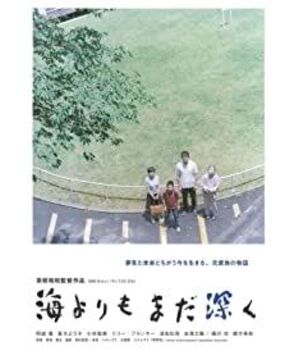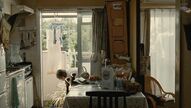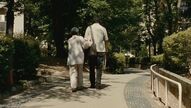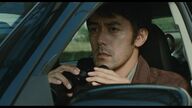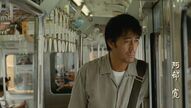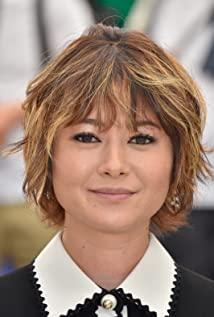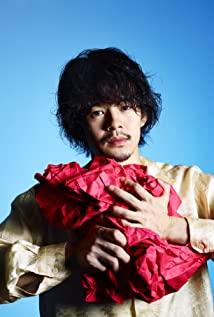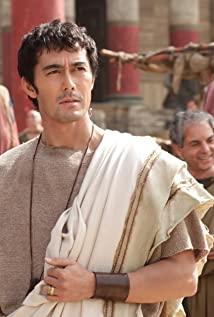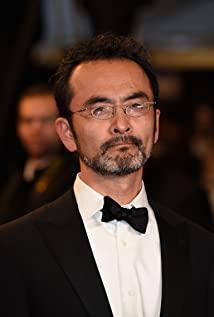It was Hirokazu Kore-eda who wrote this sentence on the first page of the script for "Deeper than the Sea": "None of us can become the adults we want to be." This has revealed that the main theme of the film is not a hope for the future, but contains A retracement of an irreversible past. As far as the cast is concerned, Hiroki and Hiro Abe are invited to play the mother-son role again, which reminds people of the director's old work "Never Stop". For the director, "Deeper Than the Sea" is a response to "Never Stop", and it is also a variant narrative. Using a similar actor structure and a close story background, but by constantly changing the settings of the actor's identity, cutting into the story itself from different angles, this way of handling is really reminiscent of the predecessor Ozu. But it's not Ozu after all. Even if it's a similar subject matter, the way the shots are scheduled and the way the actors handle it is completely different. And "Deeper Than the Sea" has more of a bitterness approaching reality than the director's previous work. This taste comes from the many identities of the film's protagonists themselves.
much complicated
If you are familiar with the director's previous works, many of the characters in the film are more complex than the protagonists of the director's previous works. The core proposition of many treatments in "Like a Father, Like a Son" is the relationship with the son. Although the relationship with the parents and the relationship with the wife are all covered, the focus of the film is obviously not this. What I observe more is the father and mother in my eyes, so although I have a son, the parent-child relationship is not the focus of the film. According to Shie, eight years have passed since "Never Stop", and both the director and Hiroshi Abe have entered the ranks of "fathers". Of course, the father-son proposition has become one of the core propositions of the film. In addition to the parent-child relationship, there are also the relationship with the divorced wife, the relationship with the old mother, the relationship with the sister, the relationship with the deceased father, and the relationship with the colleague of the detective agency. There are many, many relationships to deal with in the film that make up the complexity of the character itself. At the same time, the audience can easily feel a lot of pressure, such as financial embarrassment, and the unsuccessful career cannot meet the fixed monthly maintenance fee for the divorced wife and children. When he was young, he was very talented in writing, but in the end he could only become a writer who did not win awards. Due to financial pressure, he had to switch careers to become a private detective. He was a gambler, so he was often strapped for money, and extorted middle school students. An adult like you!" Such a failed and decadent middle-aged character appears for the first time in Shizhi's works.
But Zhi did not flatten the images of many characters, otherwise this character would not have given 10,000 yen to his mother as pocket money when he was in financial trouble, especially before he was called by loan sharks for debt collection, although During this period, there was a lot of guilt from not going home for a long time. Later, my mother continued to pour the milk into the cup and put it in the refrigerator to chill, indicating that I have been waiting for the next arrival, and it can be speculated that I have not returned home for a long time. Even if you don't have a "late bloomer" like a son from other families, you can't buy three rooms for your mother to live in, and you don't have the face to go back, you can still accompany your mother for a walk in her spare time. The mother and son met the mother's music teacher, and then the camera followed the two of them. The routes of the two groups of characters were obviously "staggered" and went to different paths. This detail and previous situation point to another proposition of the film, which is the loneliness of the elderly. The music teacher played by Qiao Zong Gong also has to help his daughters get clothes to wash. Many of them can take care of their old mothers even if they are not good enough. So the two groups go on different paths, alluding to the old age of an old man in a situation similar to that of a music teacher. This is what the director off-camera sees, the current situation of the elderly people in Dandi where he once lived.
past, present and future
When Shu Xilin explained the film, he said that even if there is something forgotten, he will not go back to find it. But the main characters in the film are almost all trapped in their past lives. Many take advantage of his convenience as a detective, so peeping into the life of his ex-wife Hiroshi after the divorce has become a logical thing, because for him, this is part of his "job" and he is completely at ease. As a private detective, he has witnessed the reality that more and more couples have cheated and calculated each other. While he can't help but wonder about marriage, he also wants to know his ex-wife's attitude towards him. Conversation with female colleagues. For women, the experience of love is more like continuous painting on the traces before the drawing board, but the imprints left before are indelible. This is a rare conclusion made by the director for a woman in the film. Correspondingly, when Hiroko was having dinner with his new love, he was waiting for him to comment on many novels with expectation. This delicate and delicate scene is not to prove that Xiangzi has a lot of affection, but to prove that whether the husband and wife are separated for some reason, they will always care about everyone's feelings for the previous him/ her evaluation. If it is praised, I am proud of my original love, maybe it is the little vanity that everyone has. When the night of the typhoon came, many mothers asked: "Why did you come this far?" Xiangzi also asked a lot: "So desperately trying to be a good father, why didn't you work hard when we were together?" Although The director did not shoot the story before they separated, but we can naturally fill in the blank part. Yeah, why did it come this far? Many people desperately want to rely on their own identity to restore the past that has disappeared - the identity of a detective can spy on the behavior of their wives, and maintain an interactive relationship with the blood identity of their son, Zhenwu, but everyone understands the fact that the boat is done. So of course the end of the film will stay here. After the typhoon, maybe nothing has changed. Many people still have to rush to pay the monthly support to his ex-wife in the future. Xiangzi will also get married with his favorite new love. at the meeting place. But Typhoon Ye's conversation finally made it clear to the other party.
Like many others, the old mother couldn't let go of the past, otherwise, when Typhoon Ye Xiangzi moved in, she didn't need to secretly put away the photos of her family when they were together, and when Xiangzi wanted to stay, she would be as happy as a child. The old mother couldn't let go of her father who had just passed away. At the beginning of the film, there were many conversations with the old mother. She said that she had already made sense of her father's relics, and many also sighed that it was so fast. But if you haven't lived together for decades, it's hard to understand this kind of life experience. When people are long gone, the relics of human affairs that carry decades of feelings, each one brings mixed feelings to those who stayed. of bitterness. But at the end of the film, the old mother took another piece of the old father's clothes and put them on for a lot of people. It was probably the one she was reluctant to keep secretly. In the early morning after the typhoon, the frontal photo of the old father appeared for the first time in the place of worship at home. The old mother also chose to put it down and began to face the future life. At the same time, she also handed back the umbilical cord of Zhenwu, which symbolizes the connection, to her mother, Hiroko. These are also the two most ceremonial arrangements in the film.
father's shadow
Like many others, Zhenwu also hopes to become a civil servant when he grows up. He also likes baseball. When playing baseball, he does not want to hit a home run, and he is equally talented in writing. Don't be a hero, he tells Hiroko's new love. For him, the more important thing is that his divorced parents can live together again, which is also reminiscent of the director's old work "Miracle", so on that typhoon night, he desperately wanted to find the lottery ticket that was blown away by the wind, because Many people say that if the lottery wins, the family will be able to be together again, but we know that this is just a lie given by the father to keep the children from disappointment. In the amusement park, Satoru asked a lot of questions, did he become the adult he wanted to be? In fact, there is no need to answer, the film has already told the audience the answer, but even if it looks so useless, it is not entirely useless. After all, some potted plants, even if they do not bloom and do not bear fruit, are still useful.
Many gamblers are naturally the shadow of the old father. Even if the old mother said that he has no advantages except for his beautiful handwriting, many did not inherit this advantage, but were inherited by Zhenwu. Except for the last photo in the film, the old father has been "appearing" in the form of relics. Many people first wanted to retrieve the calligraphy and painting that they thought was priceless, and then they accidentally discovered the inconspicuous inkstone. The owner of the pawnshop told many that when his novel won an award, his father used to show it off proudly in the streets and alleys, and many of them polished the ink, and then stained the ink to sign the novel left by the old father. In contrast, at the beginning of the film, the old mother and sister wrote a card and exclaimed that the handwriting was poor and reminded of their father. This signature is a farewell to many fathers, and it is also the director's best at dealing with emotional explosions at the end of the film. The delicate script is perfectly echoed. Although the deceased father does not appear in "Haijie Diary", the whole film is the shadow of his father, and the same treatment is also placed in "Deeper than the Sea". For the old father, he also did not become an "ideal" adult. Life is never as ideal, and most of the time we can't choose the life we want to live, but no matter what, life must go on.
Originally published in "Watching Movies", please contact the author for reprinting.
View more about After the Storm reviews


